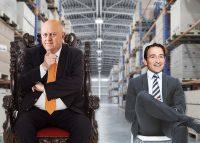Soon after Gov. Andrew Cuomo put New York’s strict social distancing rules in place, industrial broker Thomas Donovan’s phone stopped ringing. It was a sudden shift in what had been one of real estate’s hottest sectors.
But in recent days, Donovan said, folks have begun sniffing around again for space.
“We have seen people that we’re speaking to say, ‘This is [a property] that’s going to be for me. Once this initial wave of social distancing passes, we’d like to get a walk-through,’” Donovan said Friday. “Last week, we didn’t have any of those. This week, we had seven or eight people say that.”
Read more


Donovan works at Paul Massey’s B6 Real Estate Advisors, which recently had to lay off some brokers because of the pandemic-ravaged business environment. And while Donovan is still keeping busy, he acknowledged that the landscape is radically different from what it was a few months ago.
“As far as going after new business, we’re playing catch-up, whereas we normally would be more proactive,” he said. “Cold-calling an owner that we don’t necessarily know and don’t have a relationship with, we’re not that aggressive right now.”
Industrial real estate was experiencing a rare moment in the spotlight before the pandemic, as the country’s love affair with e-commerce and fast delivery was driving up demand for warehouse space. And while its brokers seem better positioned to weather the crisis than their residential and retail counterparts — if anything, e-commerce has gained market share as people increasingly stay home — they are still learning to navigate a world without site tours and meetings.
Kyle Eaton, an industrial broker at Newmark, is no longer showing properties, and although he is making a handful of cold calls, he is spending more time checking in with existing clients.
Although many of his e-commerce clients are still doing well, their continued health will likely depend on how long the economic crisis lasts and on how much it impairs consumers’ purchasing power.
“Right now, most of my e-commerce companies, their business is up,” he said, “but they’re expecting that to diminish over time, the longer this goes on.”
Moreover, the industrial-space business still relies as much on manufacturing as on Amazon and its ilk.
“E-commerce and logistics, which accounted for 47 percent of new leasing activity over the past two years, are showing resilience,” a Newmark report on the Northern New Jersey industrial market reads, “while certain manufacturers and traditional retailers are scaling back requirements.”
The report found that the pandemic had a minimal impact on first-quarter numbers, given that extreme social distancing did not start until mid-March, and absorption outpaced new supply. However, the report predicted the sector would slow in the second quarter.
It also noted that companies like Amazon and FedEx are hiring as consumers rely more and more on deliveries amid social distancing. This “could accelerate the adoption of online shopping and provide demand for logistics space” even as new leasing and construction come to a halt, it says.
But Patricia Loveall, global vice president at the Society of Industrial and Office Realtors and a Seattle-based broker at Kidder Matthews, said Amazon was not looking to increase its industrial footprint any more than it was just before the pandemic.
“Amazon has had such a huge appetite for warehouse space, but I haven’t seen them out gobbling up space right now,” she said. “I think they’re really busy just fulfilling their orders and looking at future projects.”
And Prologis, another giant of industrial real estate, recently announced that almost a quarter of its tenants are seeking rent relief — 69 days, on average — as the pandemic continues.
Loveall is focusing both on keeping existing deals together and on new business, as she does not think the economic slump will last any longer than the pandemic itself.
“All the drivers are there to go back to a good economy in the greater Seattle area once we get through this,” she said.
Uncertainty has been among the biggest issues for Loveall. Several tenants are either not renewing or not extending their leases because they cannot gauge their future needs, she said.
Eaton echoed that, saying he recently received several inquiries from logistics companies looking for short-term commitments — between six months and a year.
In Washington, one of those potential clients was King County, where a nursing home became the epicenter of the country’s coronavirus outbreak in early March. Officials reached out about using industrial space to set up care facilities for sick or homeless people, but ultimately decided to use hotels, Loveall said.
“I did receive calls from the county looking for short-term, one-year type or month-to-month type opportunities in warehouses as they were putting together their strategy,” she said. “And I think that they found that going to hotel rooms was a quicker way.”
A representative for King County Executive Dow Constantine did not respond to a request for comment. A spokesperson for New York City’s Department of Health and Mental Hygiene said the agency is “not looking for additional space at this time.”
Loveall predicted that the retail and office markets would face more lasting effects from the pandemic than industrial space would. She has been hearing annoyance but not defeatism from industrial brokers across the country, she said.
“I’m not seeing doom and gloom,” she said. “I’m seeing frustration and hearing frustration from people whose deals have been put on hold, and I think the longer this goes on, the more that’s going to ramp up.”
“But I think we all just have to take a breath and realize that we’re going to get through this,” she continued, “and there is going to be a light at the end of the tunnel.”
For Eaton, that cannot come soon enough.
“I want to get back to work in the worst way possible,” he said.
Contact Eddie Small at es@therealdeal.com
